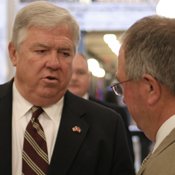State legislators were poised to pass a Medicaid agreement Tuesday evening, ending a months-long impasse over funding and removing the last major obstacle to a state budget, one day before a new fiscal year began.
Around 11 a.m. Tuesday, the day this issue went to press, Gov. Haley Barbour formally expanded the special legislative session to include Medicaid, allowing legislators to vote on the agreement, which would tax hospitals $60 million to make up a recurring Medicaid deficit.
Under the agreement, the $60 million hospital tax would gradually increase to $90 million, as the state's share of Medicaid funding increases. Currently the state pays around 16 percent of its Medicaid costs, thanks to stimulus money that supplements the roughly 3-to-1 match normally provided by the federal government. When those stimulus funds run out, the state will be responsible for roughly 24 percent of its Medicaid costs.
The agreement also gives the governor the authority to balance any future Medicaid deficits with budget cuts, a provision that was missing from an earlier Medicaid compromise that House and Senate negotiators reached last week. Barbour argued that an agreement without that provision was essentially a "blank check" for hospitals, while advocates for the hospitals saw it as a necessary protection. Tuesday's agreement allows for some minor protections: Hospitals can make up a Medicaid deficit by paying a higher assessment, and legislators can draw some money from the state's Health Care Trust Fund.
True to the contentious negotiations that preceded it, the agreement came with its fair share of rancor. Barbour insisted that he would only expand the special session to include Medicaid if the Mississippi Hospital Association endorsed the deal. MHA has loudly opposed most of Barbour's Medicaid proposals and successfully fought back his 2008 attempt to impose a hospital tax.
MHA President Sam Cameron obliged, but with an endorsement that sounded more like an attack.
"I want to warn everyone that there are hospitals who cannot afford to pay the tax provisions in this bill," Cameron said at a press conference in the Capitol rotunda Tuesday. "I want to warn everyone that service and staff reductions in local hospitals may occur as a result of this bill."
Cameron asked legislators to pass the Medicaid bill but emphasized that it was needed "to prevent Governor Barbour from trying to run the Division of Medicaid by executive order."
Barbour had warned MHA that "hospitals would face far more drastic measures" if legislators did not pass a Medicaid bill before July 1, Cameron said.
Speaking to reporters immediately after Cameron's statement, Barbour rejected his account of the negotiations.
"I have said from the beginning that no bill is better than a bad bill," Barbour said. "If they take it as a threat that I was not going to sign a bad bill for the taxpayers, then that's (Cameron's) interpretation."
The initial agreement picked up some key alterations in the House Medicaid Committee Tuesday afternoon, though. One would have required legislators to renew the deal every year, which would make Medicaid a contentious election issue, Rep. Robert Johnson, D-Natchez, pointed out.
"I'm asking you to not vote for the amendments because we worked on this bill for a very long time," Johnson told legislators on the House floor. "It's a good bill. It's not the best bill, but it's one that will take care of the 600,000-plus Medicaid recipients we have in this state."
Johnson got his wish, as legislators voted down the amendment.
Working around the Medicaid impasse, legislators passed separate appropriations bills for most state agencies on Sunday and Monday. Lawmakers passed a bill funding K-12 education that included supplemental pay for National Board-certified teachers, a line item that had been cut from some previous budget proposals.
The House and Senate also approved a 25-cents-per-pack tax increase on cigarettes from small manufacturers, the state's second cigarette tax hike this year. Legislators approved the first tax increase in May, adding 50 cents to every pack sold in the state. It was the first such increase since 1985. Now, this second tax levies an additional 25 cents per pack on cigarettes manufactured by companies that were not part of Mississippi's 1997 lawsuit against Big Tobacco.
Barbour, a former tobacco lobbyist, indicated that he would sign the new tax. Lawmakers expect the new cigarette tax to generate $8.8 million per year, no mean sum in a tight budget year.



Comments
Use the comment form below to begin a discussion about this content.